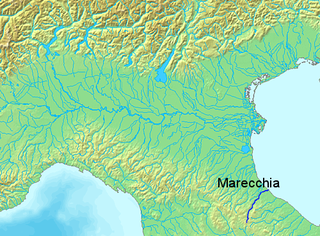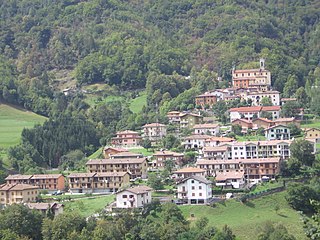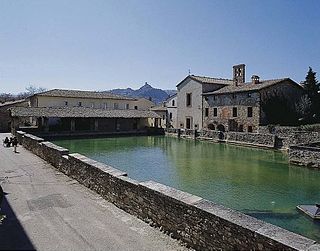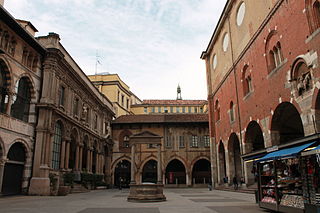| Vallone dei Mulini | |
|---|---|
 | |
| Geology | |
| Age | About 37,000 years old |
| Geography | |
| Location | Sorrento, Italy |
Vallone dei Mulini or Valle dei Mulini (known in English as Valley of the Mills) is a historic valley in Sorrento, Italy.
| Vallone dei Mulini | |
|---|---|
 | |
| Geology | |
| Age | About 37,000 years old |
| Geography | |
| Location | Sorrento, Italy |
Vallone dei Mulini or Valle dei Mulini (known in English as Valley of the Mills) is a historic valley in Sorrento, Italy.
The flour mills, built from stone as far back as the 13th century. Its name derived from its beginning function: to grind grain. The valley originates from the release of waters into a tufa plain about 37,000 years ago, following the eruption of the Campi Flegrei.
A sawmill was providing sawn wood. [1] It was in operation until the beginning of the tenth century. In 1866, Piazza Tasso was established, and it caused the mill and the surrounding sea to be isolated. The building was closed and abandoned in the 1940s.
It is located behind Piazza Tasso. The valley is carved by two rivers: Casarlano-Cesarano and S. Antonino. [2] This also means that the humidity is very high.
It is considered one of the most enchanting views of the Sorrento Peninsula. It is known for its variety and unique plants. These plants settle within ferns. Possible reasons for the appearance of these rare plants include moisture in the area, nearly complete lack of ventilation, sun exposure, and the presence of tuff. [3]

Sorrento is a town overlooking the Bay of Naples in Southern Italy. A popular tourist destination, Sorrento is located on the Sorrentine Peninsula at the south-eastern terminus of the Circumvesuviana rail line, within easy access from Naples and Pompei. The town is widely known for its small ceramics, lacework and marquetry (woodwork) shops.

Campagna is a small town and comune of the province of Salerno, in the Campania region of Southern Italy. Its population is 17,148. Its old Latin name was Civitas Campaniae. Campagna is located in one of the valleys of the Picentini Mountains, at an altitude of 270 meters above sea level.

The Marecchia is a river in eastern Italy, flowing from near Monte dei Frati in the province of Arezzo, Tuscany, to the Adriatic Sea in Rimini, Emilia-Romagna. Along its course, the river passes next to or near the settlements of Novafeltria, Verucchio, and Santarcangelo di Romagna. It passes near the Republic of San Marino. Among its tributaries are the San Marino river and the Ausa.
Chatata, meaning "clear water", is the original Cherokee name of an area located in Bradley County, Tennessee. Today the name survives in references to a number of locations in Bradley County, most notably Chatata Valley in the northeastern part of the county. Chatata was also the original name of an unincorporated community in this region now known as Tasso.

Vomero is a bustling hilltop district of metropolitan Naples, Italy — comprising approximately two square kilometres (0.77 sq mi) and a population of 48,000.

Stio is a town and comune in the province of Salerno in the Campania region of south-western Italy. As of 2016, its population was 872.

Camerata Cornello is a comune (municipality) in the Province of Bergamo in the Italian region of Lombardy, located about 60 km (37 mi) northeast of Milan and about 20 km (12 mi) north of Bergamo.

Republic Square is a piazza in Valletta, Malta. The square was originally called Piazza Tesoreria or Piazza dei Cavallieri, since the treasury of the Order of Saint John was located in the square. After a statue of Queen Victoria was installed in the square in the 19th century, it became known as Queen's Square or Piazza Regina. Although its official name is Republic Square, it is still commonly referred to as Piazza Regina.

The Olona is an Italian river belonging to the Po Basin, 71 kilometres (44 mi) long, that runs through the Province of Varese and Metropolitan City of Milan whose course is developed entirely in Lombardy.

The Central Funicular, is one of four funiculars in the public transportion system of Naples, Italy. The system is a true funicular: an inclined railway with two passenger cars, connected via cables, operating in concert.

Bagno Vignoni is an Italian village and hamlet (frazione) of San Quirico d'Orcia, situated on a hill above the Val d'Orcia in Tuscany. It is a popular tourist destination and well known for its hot springs.

The Cathedral of Saints Philip and James, commonly known as the Sorrento Cathedral, is a Roman Catholic cathedral located on Via Santa Maria della Pietà in Sorrento, Italy. The cathedral is dedicated to Saints Philip the Apostle and James the Just, and has been the seat of the Archbishop of Sorrento-Castellammare di Stabia since 1986. It was previously the seat of the bishops and archbishops of Sorrento.

Piazza Mercanti is a central city square of Milan, Italy. It is located between Piazza del Duomo, which marks the centre of the modern city of Milan, and Piazza Cordusio, and it used to be the heart of the city in the Middle Ages. At the time, the square was larger than it is now and known as "Piazza del Broletto", after the "Broletto Nuovo", the palace that occupied the centre of the square. In the 13th century, there were six entry points to the square, each associated to a specific trade, from sword blacksmiths to hat makers.

Piazza Tasso is a central place and square in Sorrento in the south of Italy. The square is named after the poet Torquato Tasso (1544–1595).

Museum Correale is a museum in Sorrento in the south of Italy.

The Palazzo Partanna, also once known as Palazzo Coscia, is a monumental palace located on Piazza dei Martiri 64–66 on the western edge of the neighborhood of Chiaia in Naples, Italy. The palace faces the Piazza dei Martiri.

Borgo Vecchio, also named in the Middle Ages Via Sancta, Carriera Sancta or Carriera Martyrum, was a road in the city of Rome, Italy, important for historical and architectural reasons. The road was destroyed together with the adjacent quartier in 1936–37 due to the construction of Via della Conciliazione.

The Sorrento Funicular was a steam-driven, inclined rail system located in the commune of Sorrento, within the Municipality of Naples, Italy — connecting its upper terminus at Sorrento's Hotel Vittoria to the resort's port, several hundred feet below on the Gulf of Naples. The system was designed by Italian engineer Alessandro Ferretti, began operating in 1883 and stopped operating approximately three years later.

The watermills on the Olona River are buildings used for milling activities that are scattered along the banks of the Olona River in the Lombardy region of Italy.
40°37′30″N14°22′35″E / 40.6251°N 14.3763°E